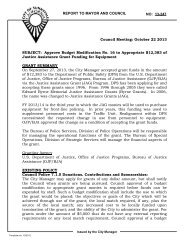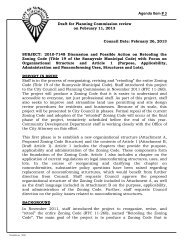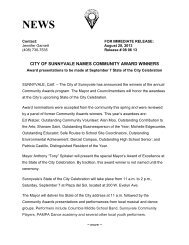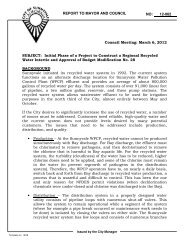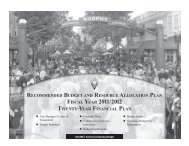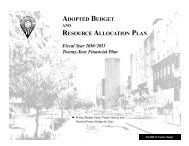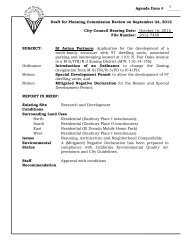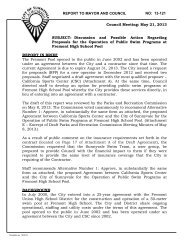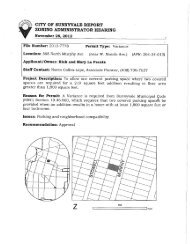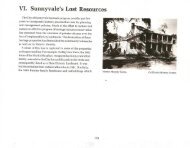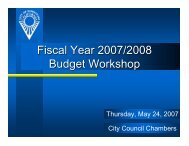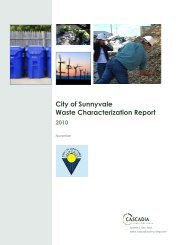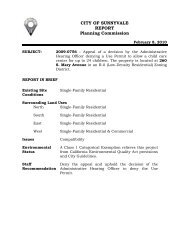- Page 1 and 2: Adopted Budget And ResouRce AllocAt
- Page 3 and 4: SUNNYVALE BUDGET GUIDE UNDERSTANDIN
- Page 5 and 6: The departmental overviews also inc
- Page 7: Two-Year Operating & Projects Budge
- Page 11 and 12: Citizen Participation Citizens have
- Page 13 and 14: June • Public Hearing is held and
- Page 15 and 16: A.3.3. An emphasis should be placed
- Page 17 and 18: B.2: Revenue Forecasting and Monito
- Page 19 and 20: Community Development
- Page 21 and 22: staffing from multiple City departm
- Page 23 and 24: the Local Redevelopment Authority (
- Page 25 and 26: Planning Program Similar to the Bui
- Page 27 and 28: Department Position Allocation Clas
- Page 29 and 30: CDD Performance Indicators b. Fire
- Page 31 and 32: CDD Performance Indicators Number o
- Page 33 and 34: Program 233 - Building Safety Servi
- Page 35 and 36: Program 233 - Building Safety City
- Page 37 and 38: Program 234 - Planning Service Deli
- Page 39 and 40: Program 234 - Planning City of Sunn
- Page 41 and 42: Program 235 - Housing and CDBG Prog
- Page 43 and 44: Program 235 - Housing and CDBG Prog
- Page 45 and 46: This Page Not Used
- Page 47 and 48: This Page Not Used
- Page 49 and 50: Department Description The Departme
- Page 51 and 52: participating in cooperative procur
- Page 53 and 54: Budget Overview and Significant Cha
- Page 55 and 56: Increased efforts are also continui
- Page 57 and 58: Department Position Allocation Clas
- Page 59 and 60:
FIN Performance Indicators Financia
- Page 61 and 62:
FIN Performance Indicators Performa
- Page 63 and 64:
Program 703 - Budget Management Ser
- Page 65 and 66:
Program 703 - Budget Management Cit
- Page 67 and 68:
Program 704 - Purchasing Service De
- Page 69 and 70:
Program 704 - Purchasing Service De
- Page 71 and 72:
Program 705 - Financial Management
- Page 73 and 74:
Program 705 - Financial Management
- Page 75 and 76:
Program 706 - Accounting and Financ
- Page 77 and 78:
Program 706 - Accounting and Financ
- Page 79 and 80:
Program 706 - Accounting and Financ
- Page 81 and 82:
Program 707 - Treasury Services Ser
- Page 83 and 84:
Program 707 - Treasury Services Tot
- Page 85 and 86:
Program 707 - Treasury Services Ser
- Page 87 and 88:
Program 707 - Treasury Services Cit
- Page 89 and 90:
Program 708 - Utility Billing Servi
- Page 91 and 92:
Program 708 - Utility Billing City
- Page 93 and 94:
Human Resources
- Page 95 and 96:
Employee Benefits The Employee Bene
- Page 97 and 98:
Recruitment/Classification This div
- Page 99 and 100:
THIS PAGE NOT USED
- Page 101 and 102:
HRD Performance Indicators Performa
- Page 103 and 104:
Program 754 - Human Resources Servi
- Page 105 and 106:
Program 754 - Human Resources Total
- Page 107 and 108:
Program 754 - Human Resources City
- Page 109 and 110:
Department Description The Informat
- Page 111 and 112:
Software Application Services and S
- Page 113 and 114:
ITD Performance Indicators Software
- Page 115 and 116:
Program 746 - Software Application
- Page 117 and 118:
Program 746 - Software Application
- Page 119 and 120:
Program 747 - IT Infrastructure Ser
- Page 121 and 122:
Program 747 - IT Infrastructure Ser
- Page 123 and 124:
Program 749 - ITD Administration Se
- Page 125 and 126:
Program 749 - ITD Administration Se
- Page 127 and 128:
Library and Community Services
- Page 129 and 130:
Library Services for Adults The Lib
- Page 131 and 132:
a senior center, dance studio, thre
- Page 133 and 134:
Borrower Services/Circulation Libra
- Page 135 and 136:
Outreach Services The Library will
- Page 137 and 138:
Department Position Allocation Clas
- Page 139 and 140:
THIS PAGE NOT USED
- Page 141 and 142:
LCS Performance Indicators Arts and
- Page 143 and 144:
LCS Performance Indicators Manageme
- Page 145 and 146:
Program 527 - Youth and Family Serv
- Page 147 and 148:
Program 527 - Youth and Family Serv
- Page 149 and 150:
Program 527 - Youth and Family Serv
- Page 151 and 152:
This Page Not Used
- Page 153 and 154:
This Page Not Used
- Page 155 and 156:
Program 620 - Library Service Deliv
- Page 157 and 158:
Program 620 - Library Service Deliv
- Page 159 and 160:
Program 620 - Library Service Deliv
- Page 161 and 162:
Program 620 - Library Service Deliv
- Page 163 and 164:
This Page Not Used
- Page 165 and 166:
City of Sunnyvale Program Performan
- Page 167 and 168:
City of Sunnyvale Program Performan
- Page 169 and 170:
City of Sunnyvale Program Performan
- Page 171 and 172:
City of Sunnyvale Program Performan
- Page 173 and 174:
City of Sunnyvale Program Performan
- Page 175 and 176:
City of Sunnyvale Program Performan
- Page 177 and 178:
City of Sunnyvale Program Performan
- Page 179 and 180:
City of Sunnyvale Program Performan
- Page 181 and 182:
City of Sunnyvale Program Performan
- Page 183 and 184:
City of Sunnyvale Program Performan
- Page 185 and 186:
City of Sunnyvale Program Performan
- Page 187 and 188:
Department Description The NOVA Wor
- Page 189 and 190:
Department Position Allocation Clas
- Page 191 and 192:
NOVA Performance Indicators Employm
- Page 193 and 194:
Program 510 - Employment Developmen
- Page 195 and 196:
Program 510 - Employment Developmen
- Page 197 and 198:
Program 510 - Employment Developmen
- Page 199 and 200:
Office of the City Attorney
- Page 201 and 202:
Department Budget Summary Office of
- Page 203 and 204:
Department Position Allocation Clas
- Page 205 and 206:
THIS PAGE NOT USED
- Page 207 and 208:
Program 750 - Comprehensive Legal S
- Page 209 and 210:
Program 750 - Comprehensive Legal S
- Page 211 and 212:
Program 750 - Comprehensive Legal S
- Page 213 and 214:
This Page Not Used
- Page 215 and 216:
Department Description The Office o
- Page 217 and 218:
Department Position Allocation Clas
- Page 219 and 220:
OCM Performance Indicators Offi ce
- Page 221 and 222:
Program 723 - Office of the City Ma
- Page 223 and 224:
Program 723 - Office of the City Ma
- Page 225 and 226:
Program 723 - Office of the City Ma
- Page 227 and 228:
Program 723 - Office of the City Ma
- Page 229 and 230:
Program 723 - Office of the City Ma
- Page 231 and 232:
Program 723 - Office of the City Ma
- Page 233 and 234:
Program 748 - Print, Copy, Bindery,
- Page 235 and 236:
Program 748 - Print, Copy, Bindery,
- Page 237 and 238:
Public Safety
- Page 239 and 240:
Programs and Services The Departmen
- Page 241 and 242:
Personnel and Training Services The
- Page 243 and 244:
In an average 24 period, Sunnyvale
- Page 245 and 246:
Budget Overview and Significant Cha
- Page 247 and 248:
Department Position Allocation Clas
- Page 249 and 250:
DPS Performance Indicators Number o
- Page 251 and 252:
THIS PAGE NOT USED
- Page 253 and 254:
Program 471 - Police Services Servi
- Page 255 and 256:
Program 471 - Police Services City
- Page 257 and 258:
Program 471 - Police Services Servi
- Page 259 and 260:
Program 471 - Police Services Total
- Page 261 and 262:
Program 472 - Fire Services City of
- Page 263 and 264:
Program 472 - Fire Services Service
- Page 265 and 266:
Program 472 - Fire Services Service
- Page 267 and 268:
Program 472 - Fire Services Service
- Page 269 and 270:
This Page Not Used
- Page 271 and 272:
Program 473 - Community Safety Serv
- Page 273 and 274:
Program 473 - Community Safety Serv
- Page 275 and 276:
Program 473 - Community Safety Serv
- Page 277 and 278:
This Page Not Used
- Page 279 and 280:
Program 474 - Personnel and Trainin
- Page 281 and 282:
Program 474 - Personnel and Trainin
- Page 283 and 284:
This Page Not Used
- Page 285 and 286:
Program 475 - Investigation Service
- Page 287 and 288:
Program 476 - Communication Service
- Page 289 and 290:
Program 476 - Communication Service
- Page 291 and 292:
Program 477 - Public Safety Adminis
- Page 293 and 294:
Program 477 - Public Safety Adminis
- Page 295 and 296:
Program 478 - Records Management an
- Page 297 and 298:
Program 478 - Records Management an
- Page 299 and 300:
Department Description The Departme
- Page 301 and 302:
Downtown Parking Lot Maintenance. P
- Page 303 and 304:
Department Budget Summary Public Wo
- Page 305 and 306:
Capital Project Management Sustaina
- Page 307 and 308:
Department Position Allocation Clas
- Page 309 and 310:
DPW Performance Indicators Transpor
- Page 311 and 312:
DPW Performance Indicators Concrete
- Page 313 and 314:
DPW Performance Indicators Number o
- Page 315 and 316:
Program 119 - Transportation and Tr
- Page 317 and 318:
Program 119 - Transportation and Tr
- Page 319 and 320:
Program 119 - Transportation and Tr
- Page 321 and 322:
Program 119 - Transportation and Tr
- Page 323 and 324:
City of Sunnyvale Program Performan
- Page 325 and 326:
City of Sunnyvale Program Performan
- Page 327 and 328:
City of Sunnyvale Program Performan
- Page 329 and 330:
City of Sunnyvale Program Performan
- Page 331 and 332:
City of Sunnyvale Program Performan
- Page 333 and 334:
Program 121 - Street Lights Service
- Page 335 and 336:
Program 121 - Street Lights City of
- Page 337 and 338:
Program 219 - Street Tree Services
- Page 339 and 340:
Program 219 - Street Tree Services
- Page 341 and 342:
Program 222 - Concrete Maintenance
- Page 343 and 344:
Program 222 - Concrete Maintenance
- Page 345 and 346:
Program 256 - Downtown Parking Lot
- Page 347 and 348:
Program 267 - Neighborhood Parks an
- Page 349 and 350:
Program 267 - Neighborhood Parks an
- Page 351 and 352:
Program 267 - Neighborhood Parks an
- Page 353 and 354:
Program 308 - Public Works Administ
- Page 355 and 356:
Program 308 - Public Works Administ
- Page 357 and 358:
City of Sunnyvale Program Performan
- Page 359 and 360:
City of Sunnyvale Program Performan
- Page 361 and 362:
Program 310 - Land Development - En
- Page 363 and 364:
Program 310 - Land Development - En
- Page 365 and 366:
Program 647 - Golf Course Operation
- Page 367 and 368:
Program 647 - Golf Course Operation
- Page 369 and 370:
Program 709 - Facility Services Ser
- Page 371 and 372:
Program 709 - Facility Services Ser
- Page 373 and 374:
Program 763 - Provision of Vehicles
- Page 375 and 376:
Program 763 - Provision of Vehicles
- Page 377 and 378:
Utilities
- Page 379 and 380:
The following graph illustrates a h
- Page 381 and 382:
Wastewater Management Provide for t
- Page 383 and 384:
of 25%. This is reflected in the op
- Page 385 and 386:
Department Position Allocation Clas
- Page 387 and 388:
Utilities Performance Indicators Pe
- Page 389 and 390:
THIS PAGE NOT USED
- Page 391 and 392:
Program 360 - Water Resources Servi
- Page 393 and 394:
Program 360 - Water Resources Servi
- Page 395 and 396:
This Page Not Used
- Page 397 and 398:
Program 361 - Storm Water Collectio
- Page 399 and 400:
This Page Not Used
- Page 401 and 402:
Program 362 - Sanitary Sewer Collec
- Page 403 and 404:
This Page Not Used
- Page 405 and 406:
Program 363 - Solid Waste Managemen
- Page 407 and 408:
Program 363 - Solid Waste Managemen
- Page 409 and 410:
This Page Not Used
- Page 411 and 412:
Program 365 - Wastewater Management
- Page 413 and 414:
Program 365 - Wastewater Management
- Page 415 and 416:
Program 365 - Wastewater Management
- Page 417 and 418:
Program 365 - Wastewater Management
- Page 419 and 420:
Program 365 - Wastewater Management
- Page 421 and 422:
This Page Not Used
- Page 423:
Tempble lev. 03/07 REPORT TO REDEVE
- Page 426 and 427:
Adoption of the FY 2011/2012 Budget
- Page 430 and 431:
THIS PAGE NOT USED



